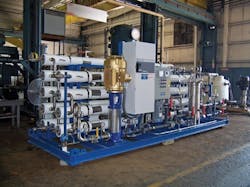Industrial Reuse: A Deeper Look Into Decentralized Water Reuse
About the author: Nick Nicholas is technical sales manager for Genesis Water Technologies. Nicholas can be reached at [email protected] or 321.280.2742.
Water is a vital resource is used in the operations of many industrial processes.
The increasing demands for water for agricultural, drinking and industrial processes has put significant strain on global freshwater supplies as the world’s population continues to grow.
In many parts of the world, the demand for water has exceeded the supplies of traditional water sources like groundwater and surface water.
In the U.S.—especially in the Southwest region, including California—the high demands and short supply of water have forced water scarcity restrictions on both industry and residential water users.
This situation is forcing serious discussions by private and governmental-level agencies to develop strategies to incorporate alternative water sources while implementing more efficient ways to use and reuse water.
Sustainable solutions will be required to mitigate the effects of climate change, reduce habitat degradation and provide for continued global population growth.
Wastewater is becoming recognized as a significant water resource for non-potable applications worldwide. Large centralized wastewater facilities often treat and discharge this resource rather than recycling and reusing it due to the costs associated with transporting the treated water back to the originating source.
This paradigm shift has led to discussion of the utilization of a decentralized wastewater solution approach that can be sustainably implemented on a community level as well as in a commercial/industrial facility setting to capture, treat and reuse this water resource optimally.
Decentralized system solutions play a pivotal role in an emerging “green, clean, smart” paradigm for water resource design and management.
Recycled water can satisfy many non-potable water demands, as long as the water is adequately treated for the intended application.
In the U.S., the U.S. Environmental Protection Agency, as well as the individual states regulate different aspects of the treatment of wastewater and have established criteria for use of reuse water.
Applications for Decentralized Reuse Water
Applications for decentralized reuse water include:
- Cooling water for power generation and oil refineries;
- Process water for industries including textile, pulp and paper, and food and beverage processing;
- Agriculture;
- Golf course and landscape irrigation;
- Commercial buildings: toilets, cleaning, and fire systems; and
- Residential communities.
The decentralized water reuse approach provides the following benefits for communities and facilities:
- It is performance based, scalable, modular, affordable and adjustable;
- It can be readily deployed without high site construction costs;
- Planning is continuous, strategic and adaptable;
- It enables site-specific customized treatment solutions, processes, structures and skills that will most effectively achieve the desired treatment results; and
- It fosters collaboration with both community, industrial and watershed stakeholders to moderate financial and environmental risk.
As climate change extends the frequency and duration of droughts and storm events, populations grow, and water becomes scarce, centralized treatment systems may not be sustainable.
A more sensible decentralized water infrastructure approach can assist in resolving significant and paralyzing water scarcity and regulatory issues, especially in drought-stricken or rural areas across the world.
New processes and technologies now make customized site-specific sustainable onsite systems cost-effective to install and maintain for both communities and facilities. This not only helps meet regulatory requirements, but also saves companies and communities money by reusing water and reducing associated water costs.
Decentralized wastewater treatment and reuse technologies are widely penetrating the market.
Specialized wastewater treatment and reuse systems provide a sustainable infrastructure solution that benefits and supports companies and communities, preserves the environment, and creates a renewable water resource cycle.
Application
A camp operator required an efficient way to treat and utilize the camp’s domestic wastewater to reduce its wastewater discharge fees. The treated water was to be treated to a standard to be used for non-drinking purposes such as irrigation, among other non-potable applications.
Wastewater analysis parameters included:
- A biochemical oxygen demand (BOD) of 200 to 300 mg/L;
- A chemical oxygen demand (COD) of 90 mg/L;
- Total suspended solids of 100 to 300 mg/L;
- Total nitrogen ammonia of 40 to 80 mg/L;
- Total phosphorus of 7 to 12 mg/L; and
- A pH level of 6 to 8.5.
Solution
Genesis Water Technologies (GWT)requested a water analysis to determine the composition of the domestic wastewater source needed to be treated.
The water analysis results were reviewed in detail to determine an optimized solution based on the specific type and levels of contamination in each water source. This domestic wastewater source was composed of elevated levels of suspended solids, BOD, COD, ammonia nitrogen and phosphorus.
GWT’s local partner consulted with the client and provided a presentation overview and diagram of the customized solution to meet the client’s water quality challenge.
The customized system solution included equalization and primary treatment to remove suspended solids and reduce BOD and COD. Secondary treatment included aerobic oxidation via membrane bioreactor technology followed by filtration and optimized disinfection.
Results
The system was installed and commissioned by the local project management and contractor, with technical assistance provided by GWT.
The treated water quality met all the client’s parameters for both its potable and non potable water consumption needs.
The treated water stream was microbiologically safe and the client experienced reduced operating cost due to the reduction of its discharge water fees; the treated water was utilized for irrigation.
Download: Here
